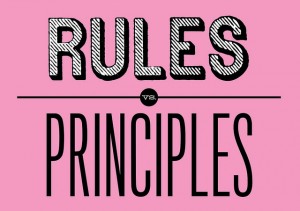Seattle recently passed a bag law, well actually a bag ban. This rule PROHIBITS stores from providing customers with single-use plastic bags. In addition, it REQUIRES stores to charge a minimum of $0.05 for paper bags (stores can’t choose to absorb the cost, they MUST pass it along). However, it wasn’t until I walked by The Gap Store today that I realized they would no longer be allowed to provide their signature (plastic) drawstring bags. It hadn’t occurred to me that the ban included clothing and retail stores. Yes, I know the law states retailers, but in the news we only heard about it affecting grocery stores. Now, suddenly, I find myself irritated and frustrated with the city and unlikely to do much shopping downtown.
I can understand and appreciate the motivation behind the law. But, what if the city had simply asked each retailer to put up a sign that said “We, along with the City of Seattle, support reducing waste. Please think about combining purchases into one bag or reusing the one we provide you. Here are some ideas: . . .”? Seattleites are already very good when it comes to recycling and reducing waste.
But, what about the tourists? Instead of leaving frustrated and without purchasing anything (because they don’t have a ‘reusable bag’ with them and, without a bag it’s difficult to get it back to their hotel), they would leave the store thinking “huh, what a great idea”.
I think something positive, that encourages individuals to act on a principle (in this case reducing waste), would go far in influencing their long-term behavior.
The problem I see with rules is they must cover every detail. We’ve all experienced that feeling of being told something is not allowed, and suddenly that is all we want to do. A rule can be broken. A principle doesn’t break. A principle offers flexibility and choice; it provides the opportunity for a society to govern itself from a position of what works for them, at that time, in that situation.
 When a rule is broken the perpetrator must be punished. But if the group operates by principles, there is room for consensus, for understanding, for situational consequences.
When a rule is broken the perpetrator must be punished. But if the group operates by principles, there is room for consensus, for understanding, for situational consequences.
What on earth does this have to do with prepping?
In a collapse the law of the land will change. While some groups will try to continue to live by the rules of the pre-collapse society, I believe those that adapt and learn to live by principles will be much more successful. When forming a post-collapse community, principles such as Safety, Respect, and Autonomy will be more useful than trying to get a group to agree on a list of rules. For example, perhaps an individual wants to ban the wearing of orange clothing because it’s too bright and attracts attention. Instead of making a rule banning orange, the principle of Safety could come into play: there may be times when orange should not be worn (moving through an area at night) but there may be times when orange promotes safety (hunting in a group) .
Not only that, but by living within a system that promotes consequences for behavior as it relates to each situation, I honestly feel like people would be more likely to think through what they are doing. Instead of trying to break a rule to get what they want, they could collaborate with friends and neighbors to obtain it in a manner consistent with the group goals. Instead of “this rule is stupid for this situation, I’ll break it and see if anyone notices”, we would have, “I would like to get this done, I wonder what is the best way to make it happen”.
It’s unlikely we could ever live exclusively by principles, but consider starting with that goal; then adding rules only when absolutely necessary.
(Friday: What We Did This Week To Prep)

